- Home
- Muriel Spark
The Driver's Seat
The Driver's Seat Read online
THE
DRIVER’S SEAT
Muriel Spark
ONE
‘And the material doesn’t stain,’ the salesgirl says.
‘Doesn’t stain?’
‘It’s the new fabric,’ the salesgirl says. ‘Specially treated. Won’t mark. If you spill like a bit of ice-cream or a drop of coffee, like, down the front of this dress it won’t hold the stain.’
The customer, a young woman, is suddenly tearing at the fastener at the neck, pulling at the zip of the dress. She is saying, ‘Get this thing off me. Off me, at once.
The salesgirl shouts at the customer who, up to now, has been delighted with the bright coloured dress. It is patterned with green and purple squares on a white background, with blue spots within the green squares, cyclamen spots within the purple. This dress has not been a successful line; other dresses in the new stainless fabric have sold, but this, of which three others, identical but for sizes, hang in the back storeroom awaiting the drastic reductions of next week’s sale, has been too vivid for most customers’ taste. But the customer who now steps speedily out of it, throwing it on the floor with the utmost irritation, had almost smiled with satisfaction when she had tried it on. She had said, ‘That’s my dress.’ The salesgirl had said it needed taking up at the hem. ‘All right,’ the customer had said, ‘but I need it for tomorrow.’ ‘We can’t do it before Friday, I’m sorry,’ the salesgirl had said. ‘Oh, I’ll do it myself, then,’ the customer had said, and turned round to admire it sideways in the long mirror. ‘It’s a good fit. Lovely colours,’ she said.
‘And it doesn’t stain,’ the salesgirl had said, with her eye wandering to another unstainable and equally unsaleable summer dress which evidently she hoped, now, to offer the satisfied customer.
‘Doesn’t stain?’
The customer has flung the dress aside.
The salesgirl shouts, as if to assist her explanation. ‘Specially treated fabric… If you spill like a drop of sherry you just wipe it off. Look, Miss, you’re tearing the neck.’
‘Do you think I spill things on my clothes?’ the customer shrieks. ‘Do I look as if I don’t eat properly?’
‘Miss, I only remarked on the fabric, that when you tell me you’re going abroad for your vacation, there is always the marks that you pick up on your journey. Don’t treat our clothes like that if you please. Miss, I only said stain-resisting and then you carry on, after you liked it.’
‘Who asked you for a stain-resisting dress?’ the customer shouts, getting quickly, with absolute purpose, into her own blouse and skirt.
‘You liked the colours, didn’t you?’ shouts the girl. ‘What difference does it make, so it resists stains, if you liked the fabric before you knew?’
The customer picks up her bag and goes to the door almost at a run, while two other salesgirls and two other customers gasp and gape. At the door she turns to look back and says, with a look of satisfaction at her own dominance over the situation with an undoubtable excuse, ‘I won’t be insulted!’
She walks along the broad street, scanning the windows for the dress she needs, the necessary dress. Her lips are slightly parted; she, whose lips are usually pressed together with the daily disapprovals of the accountants’ office where she has worked continually, except for the months of illness, since she was eighteen, that is to say, for sixteen years and some months. Her lips, when she does not speak or eat, are normally pressed together like the ruled line of a balance sheet, marked straight with her old-fashioned lipstick, a final and a judging mouth, a precision instrument, a detail-warden of a mouth; she has five girls under her and two men. Over her are two women and five men. Her immediate superior had given her the afternoon off, in kindness, Friday afternoon. ‘You’ve got your packing to do, Lise. Go home, pack and rest.’ She had resisted. ‘I don’t need a rest. I’ve got all this work to finish. Look — all this.’ The superior, a fat small man, looked at her with frightened eyeglasses. Lise smiled and bent her head over her desk. ‘It can wait till you get back,’ said the man, and when she looked up at him he showed courage and defiance in his rimless spectacles. Then she had begun to laugh hysterically. She finished laughing and started crying all in a flood, while a flurry at the other desks, the jerky backward movements of her little fat superior, conveyed to her that she had done again what she had not done for five years. As she ran to the lavatory she shouted to the whole office who somehow or other were trying to follow or help her. ‘Leave me alone! It doesn’t matter. What does it matter?’ Half an hour later they said, ‘You need a good holiday, Lise. You need your vacation.’ ‘I’m going to have it,’ she said, ‘I’m going to have the time of my life,’ and she had looked at the two men and five girls under her, and at her quivering superior, one by one, with her lips straight as a line which could cancel them all out completely.
Now, as she walks along the street after leaving the shop, her lips are slightly parted as if to receive a secret flavour. In fact her nostrils and eyes are a fragment more open than usual, imperceptibly but thoroughly they accompany her parted lips in one mission, the sensing of the dress that she must get.
She swerves in her course at the door of a department store and enters. Resort Department: she has seen the dress. A lemon-yellow top with a skirt patterned in bright V’s of orange, mauve and blue. ‘Is it made of that stain-resisting material?’ she asks when she has put it on and is looking at herself in the mirror. ‘Stain-resisting? I don’t know, Madam. It’s a washable cotton, but if I were you I’d have it dry-cleaned. It might shrink.’ Lise laughs, and the girl says, ‘I’m afraid we haven’t anything really stain-resisting. I’ve never heard of anything like that.’ Lise makes her mouth into a straight line. Then she says, ‘I’ll have it.’ Meanwhile she is pulling off a hanger a summer coat with narrow stripes, red and white, with a white collar; very quickly she tries it on over the new dress. ‘Of course, the two don’t go well together,’ says the salesgirl. ‘You’d have to see them on separate.’
Lise does not appear to listen. She studies herself. This way and that, in the mirror of the fitting room. She lets the coat hang open over the dress. Her lips part, and her eyes narrow; she breathes for a moment as in a trance.
The salesgirl says, ‘You can’t really see the coat at its best, Madam, over that frock.’
Lise appears suddenly to hear her, opening her eyes and closing her lips. The girl is saying, ‘You won’t be able to wear them together, but it’s a lovely coat, over a plain dress, white or navy, or for the evenings …’
‘They go very well together,’ Lise says, and taking off the coat she hands it carefully to the girl. ‘I’ll have it; also, the dress. I can take up the hem myself.’ She reaches for her blouse and skirt and says to the girl, ‘Those colours of the dress and the coat are absolutely right for me. Very natural colours.’
The girl, placating, says, ‘Oh, it’s how you feel in things yourself, Madam, isn’t it? It’s you’s got to wear them.’ Lise buttons her blouse disapprovingly. She follows the girl to the shop-floor, pays the bill, waits for the change and, when the girl hands her first the change then the large bag of heavy paper containing her new purchases, she opens the top of the bag enough to enable her to peep inside, to put in her hand and tear a corner of the tissue paper which enfolds each garment. She is obviously making sure she is being handed the right garments. The girl is about to speak, probably to say, ‘Everything all right?’ or ‘Thank you, Madam, goodbye,’ or even, ‘Don’t worry; everything’s there all right.’ But Lise speaks first; she says, ‘The colours go together perfectly. People here in the North are ignorant of colours. Conservative; old-fashioned. If only you knew! These colours are a natural blend for me. Absolutely natural.’ She does not wait for a reply;
she does not turn towards the lift, she turns, instead, towards the down escalator, purposefully making her way through a short lane of dresses that hang in their stands.
She stops abruptly at the top of the escalator and looks back, then smiles as if she sees and hears what she had expected. The salesgirl, thinking her customer is already on the escalator out of sight, out of hearing, has turned to another black-frocked salesgirl. ‘All those colours together!’ she is saying. ‘Those incredible colours! She said they were perfectly natural. Natural! Here in the North, she said …’ Her voice stops as she sees that Lise is looking and hearing. The girl affects to be fumbling with a dress on the rack and to be saying something else without changing her expression too noticeably. Lise laughs aloud and descends the escalator.
‘Well, enjoy yourself Lise,’ says the voice on the telephone. ‘Send me a card.’
‘Oh, of course,’ Lise says, and when she has hung up she laughs heartily. She does not stop. She goes to the wash-basin and fills a glass of water, which she drinks, gurgling, then another, and still nearly choking she drinks another. She has stopped laughing, and now breathing heavily says to the mute telephone, ‘Of course. Oh, of course.’ Still heaving with exhaustion she pulls out the hard wall-seat which adapts to a bed and takes off her shoes, placing them beside the bed. She puts the large carrier-bag containing her new coat and dress in a cupboard beside her suitcase which is already packed. She places her hand-bag on the lamp-shelf beside the bed and lies down.
Her face is solemn as she lies, at first staring at the brown pinewood door as if to see beyond it. Presently her breathing becomes normal. The room is meticulously neat. It is a one-room flat in an apartment house. Since it was put up the designer has won prizes for his interiors, he has become known throughout the country and far beyond and is now no longer to be obtained by landlords of moderate price. The lines of the room are pure; space is used as a pattern in itself, circumscribed by the dexterous pinewood outlines that ensued from the designer’s ingenuity and austere taste when he was young, unknown, studious and strict-principled. The company that owns the apartment house knows the worth of these pinewood interiors. Pinewood alone is now nearly as scarce as the architect himself, but the law, so far, prevents them from raising the rents very much. The tenants have long leases. Lise moved in when the house was new, ten years ago. She has added very little to the room; very little is needed, for the furniture is all fixed, adaptable to various uses, and stackable. Stacked into a panel are six folding chairs, should the tenant decide to entertain six for dinner. The writing desk extends to a dining table, and when the desk is not in use it, too, disappears into the pinewood wall, its bracket-lamp hingeing outward and upward to form a wall-lamp. The bed is by day a narrow seat with overhanging bookcases; by night it swivels out to accommodate the sleeper. Lise has put down a patterned rug from Greece. She has fitted a hopsack covering on the seat of the divan. Unlike the other tenants she has not put unnecessary curtains in the window; her flat is not closely overlooked and in summer she keeps the venetian blinds down over the windows and slightly opened to let in the light. A small pantry-kitchen adjoins this room. Here, too, everything is contrived to fold away into the dignity of unvarnished pinewood. And in the bathroom as well, nothing need be seen, nothing need be left lying about. The bed-supports, the door, the window frame, the hanging cupboard, the storage space, the shelves, the desk that extends, the tables that stack — they are made of such pinewood as one may never see again in a modest bachelor apartment. Lise keeps her flat as clean-lined and clear to return to after her work as if it were uninhabited. The swaying tall pines among the litter of cones on the forest floor have been subdued into silence and into obedient bulks.
Lise breathes as if sleeping, deeply tired, but her eye-slits open from time to time. Her hand moves to her brown leather bag on the lamp-shelf and she raises herself, pulling the bag towards her. She leans on one elbow and empties the contents on the bed. She lifts them one by one, checking carefully, and puts them back; there is a folded envelope from the travel agency containing her air ticket, a powder compact, a lipstick, a comb. There is a bunch of keys. She smiles at them and her lips are parted. There are six keys on the steel ring, two Yale door-keys, a key that might belong to a functional cupboard or drawer, a small silver-metal key of the type commonly belonging to zip-fastened luggage, and two tarnished car-keys. Lise takes the car-keys off the ring and lays them aside; the rest go back in her bag. Her passport, in its transparent plastic envelope, goes back in her bag. With straightened lips she prepares for her departure the next day. She unpacks the new coat and dress and hangs them on hangers.
Next morning she puts them on. When she is ready to leave she dials a number on the telephone and looks at herself in the mirror which has not yet been concealed behind the pinewood panels which close upon it. The voice answers and Lise touches her pale brown hair as she speaks. ‘Margot, I’m just off now,’ Lise says. ‘I’ll put your car-keys in an envelope and I’ll leave them downstairs with the doorkeeper. All right?’
The voice says, ‘Thanks. Have a good holiday. Have a good time. Send me a card.’
‘Yes, of course, Margot.’
‘Of course,’ Lise says when she has replaced the receiver. She takes an envelope from a drawer, writes a name on it, puts the two car-keys in it and seals the envelope. Then she telephones for a taxi, lifts her suitcase out to the landing, fetches her hand-bag and the envelope, and leaves the flat.
When she reaches the street floor, she stops at the windows of the porter’s wood-lined cabin. Lise rings the bell and waits. No one appears, but the taxi has pulled up outside. Lise shouts to the driver, ‘I’m just coming!’ and indicates her suitcase which the taxi-driver fetches. While he is stacking it in the front of the cab a woman with a brown overall comes up behind Lise. ‘You want me, Miss?’
Lise turns quickly to face the woman. She has the envelope in her hand and is about to speak when the woman says, ‘Well, well, my goodness, what colours!’ She is looking at Lise’s red and white striped coat, unbuttoned, and the vivid dress beneath, the purple, orange and blue V-patterns of the skirt and the yellow top. The woman laughs hugely as one who has nothing to gain by suppressing her amusement, she laughs and opens the pinewood door into the porter’s office; there she slides open the window panel and laughs aloud in Lise’s face. She says, ‘Are you going to join a circus?’ Then again she throws back her head, looking down through half-closed lids at Lise’s clothes, and gives out the high, hacking cough-like ancestral laughter of the streets, holding her breasts in her hands to spare them the shake-up. Lise says, with quiet dignity, ‘You are insolent.’ But the woman laughs again, now no longer spontaneously but with spiteful and deliberate noise, forcing the evident point that Lise habitually is mean with her tips, or perhaps never tips the porter at all.
Lise walks quietly out to the cab, still holding in her hand the envelope which contains the car-keys. She looks at this envelope as she goes, but whether she has failed to leave it at the door-keeper’s desk by intention, or whether through the distraction of the woman’s laughter, one could not tell from her serene face with lips slightly parted. The woman comes to the street door emitting noise like a brown container of laughing-gas until the taxi is out of her scope.
TWO
Lise is thin. Her height is about five-foot-six. Her hair is pale brown, probably tinted, a very light streaked lock sweeping from the middle of her hair-line to the top of her crown; her hair is cut short at the sides and back, and is styled high. She might be as young as twenty-nine or as old as thirty-six, but hardly younger, hardly older. She has arrived at the airport; she has paid the taxi-driver quickly and with an expression of abstract eagerness to be somewhere else. Likewise, with the porter, while he takes her bag and follows her to the desk to have it weighed-in. She seems not to see him.
There are two people in front of her. Lise’s eyes are widely spaced, blue-grey and dull. Her lips are a straight line. She
is neither good-looking nor bad-looking. Her nose is short and wider than it will look in the likeness constructed partly by the method of identikit, partly by actual photography, soon to be published in the newspapers of four languages.
Lise looks at the two people in front of her, first a woman and then a man, swaying to one side and the other as she does so, either to discern in the half-faces visible to her someone she might possibly know, or else to relieve, by these movements and looks, some impatience she might feel.
When it comes to her turn she heaves her luggage on to the scale and pushes her ticket to the clerk as quickly as possible. While he examines it she turns to look at a couple who are now waiting behind her. She glances at both faces, then looks back to the clerk, regardless of their returning her stares and their unanimous perception of her bright-coloured clothes.
‘Any hand-luggage?’ says the clerk, peering over the top of the counter.
Lise simpers, placing the tips of her upper teeth over her lower lip, and draws in a little breath.
‘Any hand-luggage?’ The busy young official looks at her as much as to say, ‘What’s the matter with you?’ And Lise answers in a voice different from the voice in which she yesterday spoke to the shop assistant when buying her lurid outfit, and has used on the telephone, and in which early this morning she spoke to the woman at the porter’s desk; she now speaks in a little-girl tone which presumably is taken by those within hearing to be her normal voice even if a nasty one. Lise says, ‘I only have my hand-bag with me. I believe in travelling light because I travel a lot and I know how terrible it is for one’s neighbours on the plane when you have great huge pieces of hand-luggage taking up everybody’s foot-room.’
The clerk, all in one gesture, heaves a sigh, purses his lips, closes his eyes, places his chin in his hands and his elbow on the desk. Lise turns round to address the couple behind her. She says, ‘When you travel as much as I do you have to travel light, and I tell you, I nearly didn’t bring any luggage at all, because you can get everything you want at the other end, so the only reason I brought that suitcase there is that the customs get suspicious if you come in and out without luggage. They think you’re smuggling dope and diamonds under your blouse, so I packed the usual things for a holiday, but it was all quite unnecessary, as you get to understand when you’ve travelled about as you might say with experience in four languages over the years, and you know what you’re doing —’

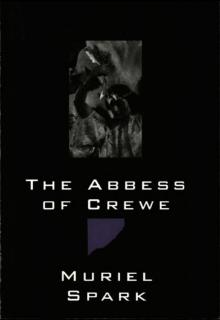 The Abbess of Crewe: A Modern Morality Tale
The Abbess of Crewe: A Modern Morality Tale Reality and Dreams
Reality and Dreams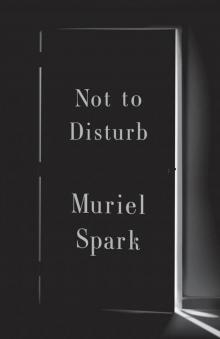 Not to Disturb
Not to Disturb The Prime of Miss Jean Brodie
The Prime of Miss Jean Brodie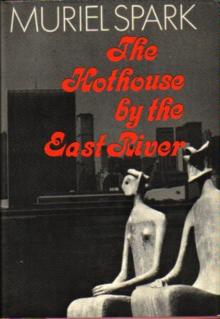 The Hothouse by the East River
The Hothouse by the East River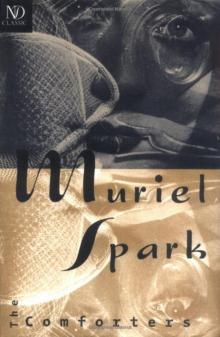 The Comforters
The Comforters (1958) Robinson
(1958) Robinson Unknown
Unknown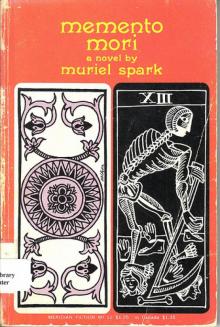 Memento Mori
Memento Mori The Finishing School
The Finishing School The Takeover
The Takeover Territorial Rights
Territorial Rights The Complete Short Stories
The Complete Short Stories The Golden Fleece: Essays
The Golden Fleece: Essays The Ballad of Peckham Rye
The Ballad of Peckham Rye Doctors of Philosophy: A Play
Doctors of Philosophy: A Play The Mandelbaum Gate
The Mandelbaum Gate Loitering With Intent
Loitering With Intent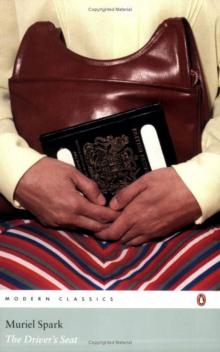 The Driver's Seat
The Driver's Seat Complete Poems: Muriel Spark
Complete Poems: Muriel Spark Symposium
Symposium Aiding and Abetting
Aiding and Abetting The Golden Fleece
The Golden Fleece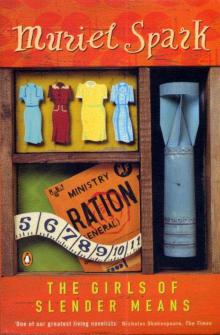 The Girls of Slender Means
The Girls of Slender Means Alice Long’s Dachshunds
Alice Long’s Dachshunds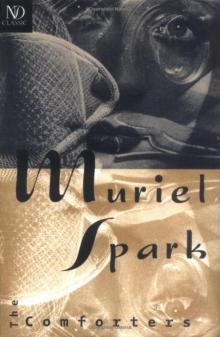 (1954) The Comforters
(1954) The Comforters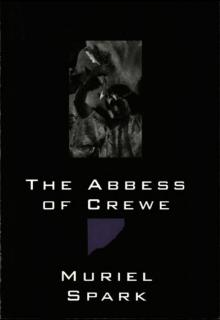 The Abbess of Crewe
The Abbess of Crewe Curriculum Vitae
Curriculum Vitae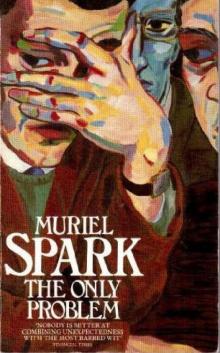 The Only Problem
The Only Problem Doctors of Philosophy
Doctors of Philosophy